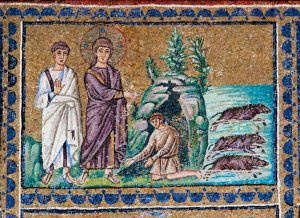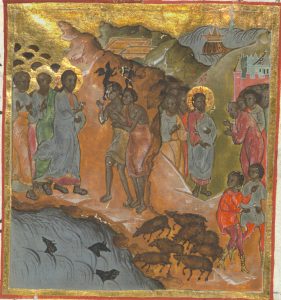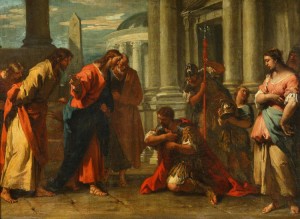Illuminations on the Lectionary readings for June 22, 2025 (Pentecost 2C/Proper 7)

Exorcism of the Gerasene demoniac (early sixth century), mosaic in the Basilica of Sant’Apollinare Nuovo in Ravenna, Italy.
First Reading (Track One): 1 Kings 19:1-15
This Sunday we return to the long season after Pentecost. Although it was once called “ordinary time,” we should not think of it as less important than the liturgical seasons around the Incarnation at Christmas or the Resurrection at Easter. Now the life and works of Jesus come to the fore. Our Track One first readings during this season will draw from the prophets of the Hebrew Bible. We begin with Elijah, a bold prophet who fought the priests of Baal and spoke truth to King Ahab and his wife, Jezebel. In this reading, fleeing an angry Jezebel’s revenge, Elijah is worn down and afraid. Fighting despair, he hides under a broom tree and begs God to take his life. But God has other plans and sends winds, an earthquake, and fire to get Elijah back to God’s work.
First Reading (Track Two): Isaiah 65:1-9
The season after Pentecost, with its green liturgical colors, now begins. In the past six months, we have marked the incarnation, death, and resurrection of Jesus. Now we begin almost six months following the life and works of Jesus as told by Luke. In our Track Two first reading, we are near the end of Isaiah’s great book of prophecy. God, speaking through the prophet, is angry because the people who returned from exile are already breaking the covenant, ignoring the Law, eating unclean food, and even worshiping idols. God is beyond anger and is ready to kill them all. But God will be just: Those who have been rebellious, who have provoked God’s anger, must pay with their lives. But God will not destroy them all. A remnant will remain to inherit Zion, God’s holy hill.
Psalm (Track One): Psalm 42 and 43
We sing two connected Psalms in Track One this Sunday. The initial hymns in the second of five books within the Psalms resonate with beautiful poetic language. Both are filled with lamentation, yet they end at last in hope and faith. The Psalmist’s soul longs for God as a deer longs for water; his soul thirsts for God. But when faith falters, the Psalmist asks over and over why God has forgotten him. Finally, faith wins as he begs God to send out light and truth and lead him to God’s holy hill.
Psalm (Track Two): Psalm 22:18-27
This passage from Psalm 22 feels consistent with God’s response to Isaiah’s plea in the first reading not to slay all of Israel. We call on God to stay close, to protect the people from danger, from the sword, and from wild animals. Let all the congregation praise the Lord, we sing. Let Israel stand in awe of God and know that God works justice and righteousness to all who seek and praise God, not least the hungry poor who seek God for protection and food.
Second Reading: Galatians 3:23-29
In his letter to the churches of Galatia (a region in Asia Minor that now includes Ankara, Turkey), Paul makes a strong argument to the communities’ largely Gentile new Christians: Gentiles are welcome into the infant church, and they need not strictly follow Jewish laws. They need not keep kosher nor be circumcised. Gentiles are in no way second-class Christians, Paul proclaims, in beautiful, inclusive language that rings through the ages: There is no longer Jew or Greek, there is no longer slave or free, there is no longer male and female; for all of us are one in Jesus. All are heirs to God’s covenant with Abraham.
Gospel: Luke 8:26-39
Having just landed in a Gentile community on the far side of the Sea of Galilee, following a stormy trip in which Jesus calmed the fierce waters, Jesus and the disciples encounter a noisy, scary man, naked and in chains. The man, or perhaps the legion of demons within, loudly greets Jesus as “Son of the Most High God.” Jesus sends the man’s demons into a herd of pigs, who rush into the Sea of Galilee and drown! This odd story may seem strange to us, but it might have made Luke’s original audience laugh: Its allusions to the hated Roman army in the name of the demon, “Legion,” residing in a naked man living in the ritually unclean setting of tombs and swine, would have seemed hilarious. Luke is likely making clear, as Paul did in Galatians, that God’s love through Jesus is unlimited and available to all.
What are “Track 1” and “Track 2”?
During the long green season after Pentecost, there are two alternative tracks each week for the Hebrew Bible reading. Within each track, there is a Psalm chosen to accompany the particular lesson.
The Revised Common Lectionary allows us to make use of either of these tracks, but once a track has been selected, it should be followed through to the end of the Pentecost season, rather than jumping back and forth between the two tracks.
For more information from LectionaryPage.net, click here.


